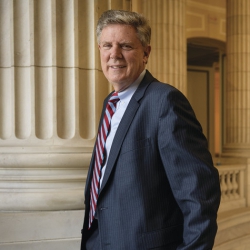US Representative Frank Pallone (D) drafted federal legislation which would recognize Native American tribes within the definition of “state”, as it pertains to sports betting jurisdictions.
Pallone’s draft bill is designed to smooth the way for tribal casinos to operate legal sportsbooks, if the U.S. Supreme Court strikes down the Professional and Amateur Sports Protection Act (PAPSA). If the high court struck down PASPA, a federal ban on sports betting would be repealed.
Tribal gaming leaders from the National Indian Gaming Association praised Frank Pallone’s efforts, saying his bill substantially addresses their issues with PASPA repeal. A tribal official who requested anonymity said the bill “goes a long way” towards the kind of law his coalition could support.
Sports Betting Bill’s Language
The bill also states that nothing in the federal legalization of sports betting “shall be construed as altering, limiting or extending” state law or tribal gaming compacts. It is a fine point, but an important one to help tribal gaming authorities respond to the repeal of PAPSA in a timely fashion.
Frank Pallone’s legislation also would not impact guarantees made to Native American tribes under the Indian Gambing Regulatory Act (IGRA). After decades staking out sovereignty under the federal judicial system, tribes do not want anything which rolls back hard-won legal rights.
244 Tribal Gaming Authorities Oppose PAPSA Repeal
Since US states began to challenge PASPA five years ago, the nation’s 244 gaming tribes have grown concerned that the overturn of the federal ban on sports betting would leave them at a disadvantage. IGRA states a tribal casino must negotiate with the US state in which it is located before changing the games they can offer. Tribal authorities are concerned that, while they renegotiate their compact with the state, commercial casino interests will move to open profitable sportsbooks.
Given the ability to build a customer base first, tribal casino operators in 29 states wonder whether their competition will gain a permanent advantage in the sports betting market. For that reason, Michigan tribes have lobbied the state legislature to put a 5-year moratorium on commercial sportsbooks, to allow the tribes to negotiate their own terms. Influential tribes in other states can be expected to make similar overtures.
Eliminates Need for 29 Lobbying Efforts
The federal draft legislation by Frank Pallone is designed to eliminate the need for 29 different lobbying and counter-lobbying efforts. At one fell swoop, a federal bill would state that sports betting does not affect the gaming compacts — and tribes do not need to renegotiate a deal simply to open a sportsbook.
In short, the playing field would be level when it comes to legalized sportsbooks. The tribes would not have to plot to undermine commercial sportsbooks. The commercial gaming interests would not have to fight to maintain their advantage. Everyone could start from Day 1 to build a regulated sports betting market.
Michigan Sports Betting Laws
The example of Michigan is instructive. The Michigan State Legislature might decide it is best to give the 13 gaming tribes in their state what they want, blocking the 3 commercial casinos from building sportsbooks. A casino like MGM Detroit, owned by a Las Vegas sportsbook operator with a large database of sports bettors, would not gain an advantage over the Michigan tribes.
Would that serve Michigan’s state government well? Would it serve the interests of Michigan’s sports betting community, or its nascent bookmaking industry?
Probably not, because the entire Michigan sports betting industry would be put at a disadvantage in relation to the states around it. Michigan gamblers would cross state lines to bet on sports for several years, perhaps becoming loyal customers of those out-of-state gaming operations. The tribes would knock down MGM Detroit, but at the cost of hamstringing the entire sports betting industry of Michigan.
National Indian Gaming Association (NIGA)
In recent months, the issue has divided some of the Native American gaming industry’s most powerful interests, who collectively represent a $31.2 billion industry. The National Indian Gaming Association (NIGA) opposes the striking down of PAPSA, because it would strengthen states rights on the issue of gambling. Due to their nearly 30 years of protection under federal laws, NIGA believes it is best to support federal law over state laws.
American Gaming Association (AGA) Adds Tribal Leaders
Nine tribal governments and gaming enterprises joined the American Gaming Association in May 2016. Since then, some of the wealthiest and most influential tribla gaming groups have supported the AGA’s broad agenda for US gambling.
At the moment, John Muncy of the Morongo Band of Mission Indians, Felix Rappaport of Foxwoods Resort Casino, Mark Fulton of Cherokee Nation Entertainment, Juan Rico of the Chickasaw Nation, and Brent Pinkson of Wind Creek Hospitality all sit on the AGA’s Board of Directors. These tribal leaders support repeal of the PASPA, like the American Gaming Association does.
American Sports Betting Coalition (ASBC)
The AGA has joined with the American Sports Betting Coalition (ASBC) — a wide ranging association of gaming companies, law enforcement officers, and elected officials — to lobby the US Congress to repeal PASPA. Even if the US Supreme Court does not do the AGA’s and ASBC’s handiwork for them, they intend to see sports betting bans repealed at the national level of government.
An official with NIGA stated his group is pleased with the draft legislation Frank Pallone submitted. Lobbyists from the group are said to have given input to Frank Pallone while he was drafting the legislation. The official said, “His draft bill goes a long way toward what tribes could support.”
The ASBC, on the other hand, says it wants to “give states the ability to decide the question of legalization.”
The ASBC website wants to focus on issues like integrity, consumer protections, responsible gaming, transparency (to law enforcement), and taxation, to make sure offshore operators do not have an undo advantage.

